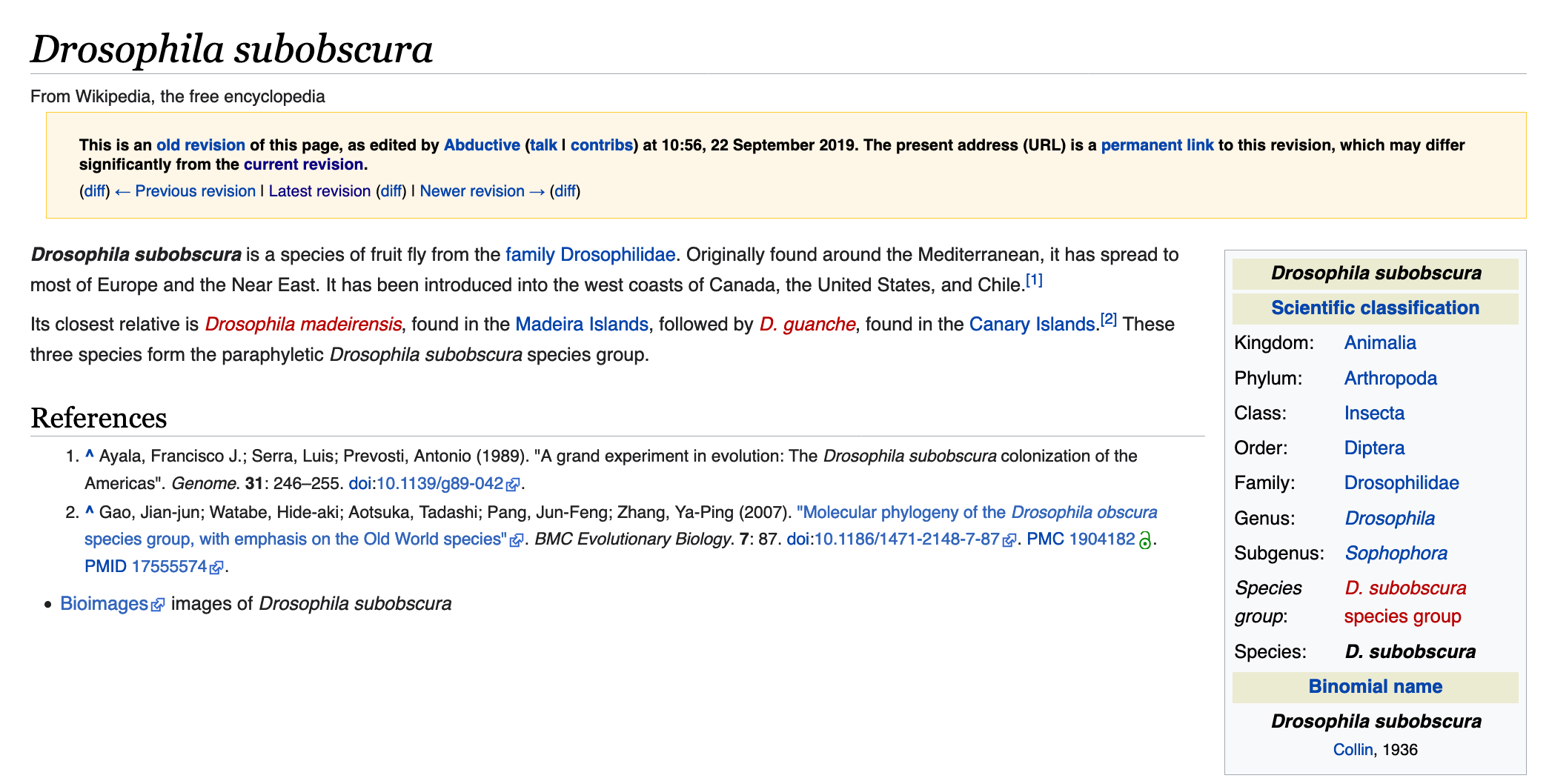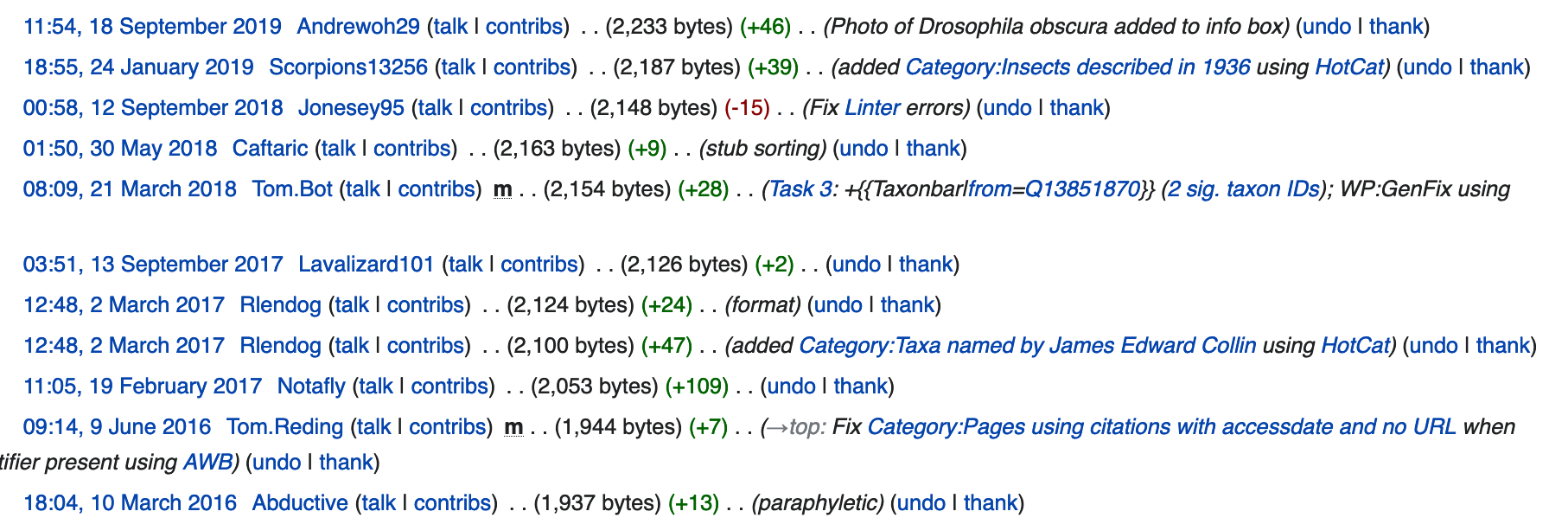
Andrew Oh was drawn to the Wikipedia assignment even before taking Dr. Joan Strassmann’s class at Washington University in St Louis. “In fact, I signed up for the class because its course listing description talked about how we’ll be writing for Wikipedia,” Andrew tells us in an interview. “No other class on the listing had a description remotely similar, and I was curious as to what exactly we would be writing on. I was excited!”
Andrew chose to focus on Drosophila subobscura, a species of fruit fly whose Wikipedia page was in need of some attention.
“The class teaches us to contribute to the academic community by writing Wikipedia articles on incomplete or nonexistent entries of a specified animal group,” Andrew explains. “Out of the given list of flies to choose from, I chose Drosophila subobscura.”

Before Andrew started making edits in September 2019, there had only been a handful of changes made to the article in the last few years.

With a stub like this one, it may seem simple to know where to fill in the gaps. They’re everywhere! But, as Andrew explains, adding content to the page was not without its challenges.
“I basically had to write the entire article from scratch. Writing the article itself was hard, but spending a greater part of the semester dissecting journal articles on my fly was incredibly challenging. Some of the ones I read were from the late 19th century, and interpreting those studies was a challenge. In order to deal with this, the class was structured in a way where we are put into groups of three, where each member of the group was assigned a role — Wikipedia expert (person that would help with the ins and outs of navigating Wikipedia), writer (person that edits our manuscripts), and fact checker (person that would make sure the information we were conveying was accurate). The group-centered aspect of the class helped with my writing process, because I would always have my group members to check my work and bounce ideas off of. My group in particular was extremely helpful (thank you, Justin and Emmanuel)!”
“The reason I chose that fly was not really a compelling one — it just sounded cool. I recognized the Drosophila name from my biology classes, so I just said ‘sure’ and chose it.”
Although there may not have been a rhyme or reason to his initial choice, Andrew dove into improvements head on. So much so that the page earned an acknowledgement on Wikipedia’s main page in the “Did you know?” column on October 22, 2019.
Did you know … that the gut bacteria of Drosophila subobscura can influence its mating behavior?
Then, Andrew continued to make improvements into January, well after his course ended, until content was high quality enough for a Good Article designation — the second highest quality designation on Wikipedia.
“I started out by nominating the article for Good Article status — this gets the attention of the Wikipedia community, as the article gets listed as a ‘Good Article nominee’ and can be reviewed by a designated reviewer. After about a month from my nomination, a reviewer made contact with me, asking if I was still available to acknowledge some edits. I responded, confirming my availability. The reviewer listed all of the edits and changes I could make to help my article reach Good Article status (according to a set of community-decided guidelines). After some back and forth, making edits and receiving more feedback, I eventually put my article in ‘Good Article’ shape. The editing process took about three days of work. I was sitting in the library when I randomly got a notification saying that my article was promoted to Good Article status, and I silently celebrated. It was a good time.”
As compared to a traditional assignment, Andrew says he appreciated the new challenges of a Wikipedia writing assignment.
“I’ve taken enough classes that are structured with the traditional two midterms / one final test format, so it was great to see that change in my academic schedule. Plus, the fact that we were actively contributing to the academic community, and the work I did in this class would be used by scholars for years to come, was a really fulfilling thought that made me feel proud of my work. Although traditional assignment structures have a place in the academic pursuit of our students, it’s always nice to see learning conveyed in a different way.”
And Andrew says he’s proud of how it all turned out.
“I feel pretty good about it! It’s fun to read over the article occasionally and think about the work I put into it. I will check the ‘history’ of the article daily, and see if any new edits are made. Now that the article is Good Article status, I feel much more confident in its quality. Overall, I’m very satisfied and proud of my work.”
To learn more about Wiki Education’s free resources and support for this assignment, visit teach.wikiedu.org. Also check out Dr. Strassmann reflections on the assignment here or another of her student’s experience with the Good Article process here.
